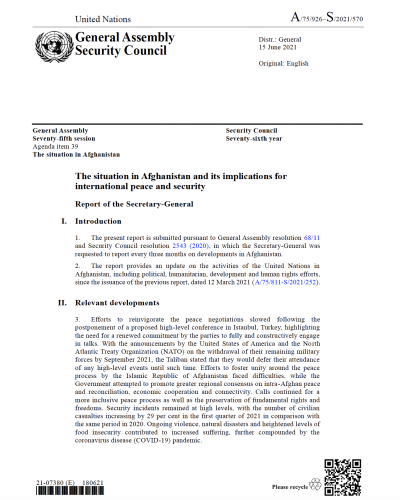The situation in Afghanistan and its implications for international peace and security - Report of the Secretary-General (A/75/926–S/2021/570)

I. Introduction
1. The present report is submitted pursuant to General Assembly resolution 68/11 and Security Council resolution 2543 (2020), in which the Secretary-General was requested to report every three months on developments in Afghanistan.
2. The report provides an update on the activities of the United Nations in Afghanistan, including political, humanitarian, development and human rights efforts, since the issuance of the previous report, dated 12 March 2021 (A/75/811-S/2021/252).
II. Relevant developments
3. Efforts to reinvigorate the peace negotiations slowed following the postponement of a proposed high-level conference in Istanbul, Turkey, highlighting the need for a renewed commitment by the parties to fully and constructively engage in talks. With the announcements by the United States of America and the North Atlantic Treaty Organization (NATO) on the withdrawal of their remaining military forces by September 2021, the Taliban stated that they would defer their attendance of any high-level events until such time. Efforts to foster unity around the peace process by the Islamic Republic of Afghanistan faced difficulties, while the Government attempted to promote greater regional consensus on intra-Afghan peace and reconciliation, economic cooperation and connectivity. Calls continued for a more inclusive peace process as well as the preservation of fundamental rights and freedoms. Security incidents remained at high levels, with the number of civilian casualties increasing by 29 per cent in the first quarter of 2021 in comparison with the same period in 2020. Ongoing violence, natural disasters and heightened levels of food insecurity contributed to increased suffering, further compounded by the coronavirus disease (COVID-19) pandemic.




















